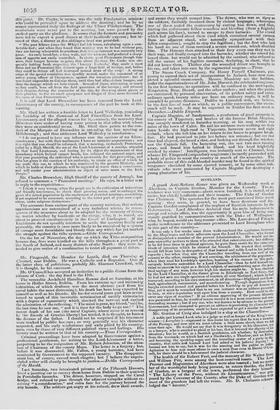Mr. Fitzgerald, the Member for Louth, died on Thursday at
Clontarf, near Dublin. He was a Catholic and a Repealer. One of the latter class of politicians, probably Mr. Sharman Crawford, will, it is thought, be his successor.
Mr. O'Connell has accepted an invitation to a public dinner from the citizens of Cork : the day fixed is the 17th.
The venerable Archibald Hamilton Rowan died on Saturday, at his house in Holies Street, Dublin, From his extreme age and increasing infirmities, of which deafness was the most obvious (and from his social habits the most distressing), his death has been long expected by himself as well as his friends. He has for several years past been accus- tomed to speak of this inevitable termination of earthly vicissitudes with a degree of equanimity which shocked the nervous and excited the admiration of the reflecting. " The mind is gone, my friend," said he, the last time he saw me, "audit is time for the body to-go too! " The recent death of his son (the naval Captain, whose name is so revered by /lie friends of Grecian liberty) has tended, it is thought, to hasten the decease of the father. I should not be surprised if his interment were marked by public honours ; so very generally was his character respected, and his early misfortunes and exile pitied by his country. men, even by those of very different political views and feelings. His history must be written in that of his country.—Times Correspondent.
Criminal proceedings have been adopted by Government against a professional gentleman, for writing to the Lord-Lieutenant a letter, purporting to be the resignation of Mr. Robert Johnston, of the situa- tion of Chairman of the county Mayo. The letter is a forgery; but, before it was discovered, Mr. Fallon, a young barrister, had been nominated by Government to the supposed vacancy. The disappoint- ment has, of course, caused much chagrin ; but I believe the unprin- cipled writer will shortly be brought to justice.—Dublin Correspondent of the Herald.
Last Saturday, two intoxicated privates of the Fifteenth Hussars, hired a jaunting-car to convey them home from Dublin to their quarters in Portobello barracks. The driver, however, stopped on the Canal bridge, and refused to pass through the adjacent turnpike without re- ceiving "a consideration," and extra fare for the journey beyond the city bounds. The soldiers got angry at his refusal, drew their swords, and swore they would compel him. The driver, who was as tipsy as the soldiers, foolishly incensed them by violent language; whereupon
one of the:n ended the controversy by cutting him down, and then, leaving the unfortunate fellow senseless and bleeding (from a frightful gash across his face), turned to escape to their barracks. The crowd which had gathered about them (and which contained several carmen from an adjacent stand, who naturally sympathized with their fallen companion), sought to stop the fugitives ; but the first who laid
his hand on one of them received a severe sword-cut, which disabled him. The Hussars then attacked in their fury every one they met in their way, and finally escaped into the barracks, whither the crowd fol- lowed them, but would not be admitted by the sentinel, who refused to tell the names of his fugitive comrades, declaring, in short, that he did not know them. Thither also the wounded driver was brought in his car, and taken into care by the regimental surgeon.— Times.
The Steam Coach Company, Sir Henry Parnell Chairman, pur- posing to extend their act of incorporation to Ireland, have now com- pleted a splendid steam-coach. Messrs. Maudslay are the builders, under the superintendence of Mr. John Macneil, the celebrated engiueer. In the first instance, its operations will be confined to the metropolis, Kingstown, Bray, Howth, and the other outlets ; and when the public are convinced, by personal observation, of its perfect safety and extra- ordinary speed, twenty miles per hour on ordinary roads, it will be extended to greater distances. Dublin to Limerick will, we believe, be the first line of road on which, as a public conveyance, the steam. coach will be used. It may be expected in 'Dublin the first week in December.—Dublin Dispute/i.
Captain Maguire, of Sandymount, a gentleman of good property in the county of Tipperary, and brother of the famous Brian Aluguire, was savagely murdered on Saturday morning, at his seat within two miles of the town of Calk. He and his mistress were walking on their lawn beside the high-road to Tipperary, between seven and eight o'clock, where she left him on her return to the house to prepare break- fast. He had promised to join her before ten minutes ; but ere that time had elapsed, she heard a shot, and looking out through the window, saw the Captain fall. On hastening out, she saw two men running away, and found him bathed in blood, and his head frightfully crushed by stones ! Intelligence_ was instantly sent to Clonmel, from whence Dr. Fitzgerald (stipendiary magistrate) instantly proceeded with a body of police to scour the country in search of the assassins. The probable cause of this cold-blooded murder may be found in the spirit of vengeance cherished by some ejected tenants, or by some other. indi- viduals who were prosecuted by Captain Maguire for destroying a young plantation of his.


















 Previous page
Previous page